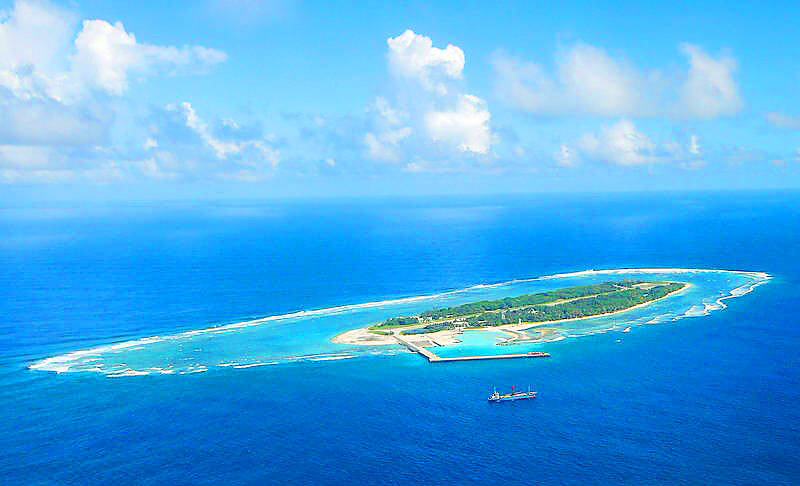The government is to test a medium Earth orbit satellite system on Itu Aba Island (Taiping Island, 太平島) at the end of next month and aims to activate the low Earth orbit system OneWeb in the first half of this year, the Ministry of Digital Affairs said yesterday.
Tests of two satellite systems are part of the ministry’s two-year verification plan, which was launched last year to use non-geostationary satellites to bolster the digital resilience of the nation’s communication networks in times of crisis.
A geostationary satellite system is being used for communication purposes on Taiping Island, with its bandwidth accounting for only one-fifth of the medium Earth orbit system, Minister of Digital Affairs Audrey Tang (唐鳳) told a news conference.

Photo: Reuters
“Once the medium Earth orbit satellite system is launched, the bandwidth available on Taiping Island would increase fivefold. The test on the island is scheduled for the end of next month,” she said.
OneWeb is to be activated during the first half of this year, she added.
“We are to discuss with the Ministry of National Defense about including verification of digital resilience in its military exercises this year. This would help defense officials gauge the bandwidth it would need and plan for the installation of satellite gateways,” she said.
Department of Communication and Cyber Resilience Director-General Cheng Ming-tsung (鄭明宗) said that 16 ground gateways for low and medium Earth orbit systems have been built.
The digital ministry would complete the installation of the medium Earth orbit system should the test on Taiping Island go successfully, Cheng said.
“We would not verify one satellite system only. We are aiming to build a diverse, heterogeneous and resilient communication system. Tests on other satellite systems would be conducted as long as they meet national security and cybersecurity requirements,” he said.
The verification plan would test the first-generation OneWeb satellite system, with signals coming from gateways in Japan, Thailand and Guam, he said.
“We will support Chunghwa Telecom Co’s (中華電信) procurement of the second-generation OneWeb satellite system, and gateways would need to be built here on Taiwan proper for the signals to cover the entire nation,” Cheng said.
The satellite systems are mainly for political use and military command systems, not for the public to access the Internet, Deputy Minister of Digital Affairs Lee Huai-jen (李懷仁) said.
Aside from testing satellite systems, the ministry said that it would bolster protection of the nation’s critical infrastructure, such as submarine cables, Radio Taiwan International and National Police Radio.
Builders of critical infrastructure and relevant service providers must have cybersecurity protection plans to prevent potential disruptions of services caused by natural disasters, terrorist attacks or cybersecurity breaches, it said.
They must stipulate procedures to detect, report and recover from cybersecurity breaches, it said, adding that the National Communications and Cyber Security Center is in charge of monitoring the operation of critical infrastructure, assisting operators in addressing cybersecurity and sharing intelligence.
Last year, the center shared 760,336 pieces of cybersecurity information with critical infrastructure operators, it said.
Meanwhile, the ministry said it aims to accelerate the construction of a 5G system and broadband services around the nation — particularly in urban areas and outlying islands — by offering incentives to telecoms.
As of last year, about 97.4 percent of Taiwanese were covered by 5G, while the average high-speed broadband service coverage rate had risen to 76.29 percent, it said.

The Central Election Commission has amended election and recall regulations to require elected office candidates to provide proof that they have no Chinese citizenship, a Cabinet report said. The commission on Oct. 29 last year revised the Measures for the Permission of Family-based Residence, Long-term Residence and Settlement of People from the Mainland Area in the Taiwan Area (大陸地區人民在台灣地區依親居留長期居留或定居許可辦法), the Executive Yuan said in a report it submitted to the legislature for review. The revision requires Chinese citizens applying for permanent residency to submit notarial documents showing that they have lost their Chinese household record and have renounced — or have never

A magnitude 5.6 earthquake struck off the coast of Yilan County at 12:37pm today, with clear shaking felt across much of northern Taiwan. There were no immediate reports of damage. The epicenter of the quake was 16.9km east-southeast of Yilan County Hall offshore at a depth of 66.8km, Central Weather Administration (CWA) data showed. The maximum intensity registered at a 4 in Yilan County’s Nanao Township (南澳) on Taiwan’s seven-tier scale. Other parts of Yilan, as well as certain areas of Hualien County, Taipei, New Taipei City, Taoyuan, Hsinchu County, Taichung and Miaoli County, recorded intensities of 3. Residents of Yilan County and Taipei received

Taiwan has secured another breakthrough in fruit exports, with jujubes, dragon fruit and lychees approved for shipment to the EU, the Ministry of Agriculture said yesterday. The Animal and Plant Health Inspection Agency on Thursday received formal notification of the approval from the EU, the ministry said, adding that the decision was expected to expand Taiwanese fruit producers’ access to high-end European markets. Taiwan exported 126 tonnes of lychees last year, valued at US$1.48 million, with Japan accounting for 102 tonnes. Other export destinations included New Zealand, Hong Kong, the US and Australia, ministry data showed. Jujube exports totaled 103 tonnes, valued at

BIG SPENDERS: Foreign investors bought the most Taiwan equities since 2005, signaling confidence that an AI boom would continue to benefit chipmakers Taiwan Semiconductor Manufacturing Co’s (TSMC, 台積電) market capitalization swelled to US$2 trillion for the first time following a 4.25 percent rally in its American depositary receipts (ADR) overnight, putting the world’s biggest contract chipmaker sixth on the list of the world’s biggest companies by market capitalization, just behind Amazon.com Inc. The site CompaniesMarketcap.com ranked TSMC ahead of Saudi Aramco and Meta Platforms Inc. The Taiwanese company’s ADRs on Tuesday surged to US$385.75 on the New York Stock Exchange, as strong demand for artificial intelligence (AI) applications led to chip supply constraints and boost revenue growth to record-breaking levels. Each TSMC ADR represents